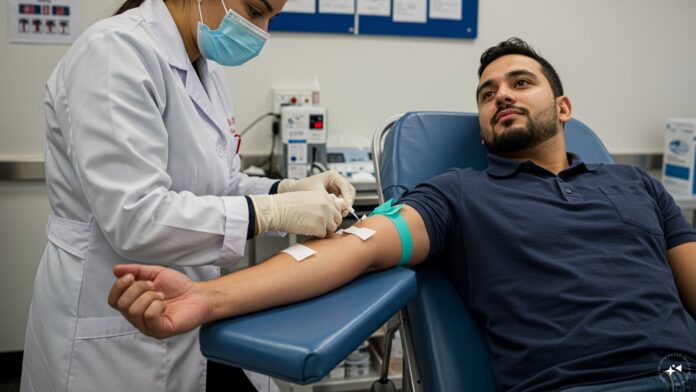Last Updated:
If you are planning to donate blood for the first time, then check out this expert-approved guide that lists out things that first-time blood donors should be aware of.
Eat a proper meal before donating blood to avoid lightheadedness. (AI Generated Image)
Donating blood for the first time can feel daunting, but it’s one of the most impactful acts of kindness you can offer. With just one donation, you can potentially save up to three lives. A little preparation and reassurance go a long way in making your first experience smooth, safe, and empowering.
Ahead of World Blood Donor Day, marked on June 14, we break down everything you need to know. Dr. Sangeeta Pathak, Director & Head of Transfusion Medicine at Max Super Speciality Hospital, Saket shares a list of things that first-time blood donors should know.
Who Can Donate Blood?
Blood donation is a life-saving act, but not everyone may be eligible to donate. Donors must be in good general health, mentally alert, and physically fit. The age bracket for donation ranges from 18 to 65 years, though first-time donors must be under 60.
Before donating, your blood pressure, pulse, body temperature, and haemoglobin level (at least 12.5 gm/dL) will be checked to ensure you’re fit for donation. Additionally, men can donate whole blood every three months, while women can donate once every four months.
Pre-Donation Essentials
Preparation plays a key role in a safe blood donation. Eat a proper meal before your appointment to maintain energy levels and reduce the risk of lightheadedness. First-time donors should also ensure they are free from chronic conditions related to the lungs, liver, kidneys, gastrointestinal or genitourinary systems.
Recent surgeries matter too: if you’ve undergone a major surgery within the past year or a minor surgery in the last three months, you’ll need to wait before donating.
Medical Conditions That Allow or Prevent Donation
Certain chronic illnesses may or may not disqualify you. For example, individuals with diabetes managed with oral medication can donate blood, but those on insulin therapy are not eligible. Similarly, donors with benign thyroid conditions can donate if they are asymptomatic and stable for at least eight weeks without a dose adjustment. However, individuals with thyrotoxicosis or malignant thyroid tumours are permanently deferred.
Who Is Permanently or Temporarily Deferred?
Some conditions permanently disqualify a person from donating blood. These include:
- Hepatitis B or C
- Schizophrenia
- Sexually transmitted infections like syphilis and gonorrhoea
- Any form of cancer
Others lead to temporary deferrals:
- Conjunctivitis – deferred during illness and treatment
- Typhoid – deferred for one year
- Tuberculosis – deferred for two years after cure
- Malaria – deferred for three months
Understanding these guidelines not only ensures your safety but also that of the recipients.
- Location :
Delhi, India, India
- First Published:

